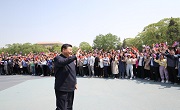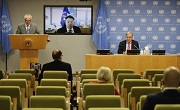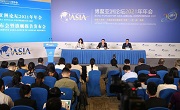Why did "Attending Tsinghua or Peking University will change your life" ignite heated debates?
"Will attending Tsinghua or Peking University truly change your life? (Tsinghua and Peking are considered the top 2 universities in China)" These days, this topic received almost 10 million views on a knowledge-sharing platform, the discussion became quite heated. What triggered the discussion are the reexamination of the belief that knowledge may change one's life and parental anxieties over their children's education.
The online discussion received thousands of answers, where many people shared their personal stories, or the stories of others who either successfully attended Tsinghua or Peking University, or failed to do so. Some people attended these schools and felt their lives were changed. Others felt attending these schools did not make their lives better. Some people did not attend Tsinghua or Peking University but still achieved success. Of course, there were others who attributed their life failures to being unable to attend these schools.
Despite the different experiences, these thousands of answers have one thing in common: they were all about how to achieve a successful life. The benchmarks of a successful life are normally centered around a high-paying job, a fine social status, and owning a car and a home. Among them, the most secure view is: although attending Tsinghua or Peking University will not guarantee the rise to the upper class, it will prevent the drop into the bottom of the social ladder.
Hence, behind the question is not merely the question of whether knowledge can still change one’s life, but a puzzle facing many individuals today: in the current social competition, is there a master key or a method that guarantees one’s achievement of a successful life? People's heated discussions on the topic of education reflected a widespread class anxiety.
As China's socio-economic and higher education development shifts from a high-speed to stable period, market competition became fiercer, the needs of human talents more urgent, and the gap between the wealth and the poor has widened. Education, which is the most important intermediate mechanism, is now filled with peer pressure and alienation. A schoolchild under parental pressure to perform well academically, also known as “chicken baby”, is the most typical new phenomenon of recent years.
The term "chicken baby" originated from the internet. It specifically refers to a popular educational method of middle-class parents from Beijing, Shanghai, and Guangzhou who aim to stimulate their children with “chicken blood” (meaning invigorating them) by scheduling all kinds of studies and activities, including tutoring sessions, specialty training classes, mathematics competitions, and summer camps in Europe or in the US......"Chicken baby" families ceaselessly force their children to compete with the end goal of attending a renowned college, whether Tsinghua or Peking University, or the Ivy League schools. These parents cannot relax for a single minute, as they put their hopes in the future where their children can remain in the "elite circles”. They have essentially gambled the meaning of their lives entirely on their children's performance.
In this process, we easily forget the reason why we are raising and educating our children. Children are being placed in a long-term competitive environment from the moment they are born. Behind the "chicken baby" phenomenon is people’s anxiety over and dissatisfaction with their current social standing. They desire to move upwards to transcend their current social status. The more in-depth issue is the intensification of social competition, and success being evaluated by a narrow and singular system for a long time. This is why, though in recent years, the government has continuously stressed a fair and healthy attitude towards education, few parents embrace it. This is also why people hope to find an easy answer like "attending Tsinghua or Peking University will indeed change your life."
Have people been truly thinking about the relationship between education and social hierarchy of our time? If the purpose of education is only to realize the expectation of parents in moving upwards on the social ladder, isn’t this breaking away from the essential purpose of education? Is the unceasing competitive and anxious mentality only destroying education, or is it destroying our lives at the same time? People hope to use good education to change their social status, but a better education should transcend these narrow definitions of high scores, renowned schools, wealth, and the respect of others. It should make us realize how we can truly take control of our lives.
People hope that attending Tsinghua or Peking University can change their lives, but entering a renowned school is far from the endpoint. Transitioning from college to society, in the important period of separating from one's parents and gaining full independence, what is central is not winning a competition, nor fully obeying one's parents, erasing one's individualistic characteristics and become entirely what parents expect him or her to become. What is more important is after one leaves the embrace of his or her parents, he or she can face the struggles in life alone, keep his or her positivity and interests, and live a life with infinite vitality within a limited time.
Living in the current society with increasingly aggressive competitions, it is difficult for us not to be taken hostage by the societal evaluation system and go with the flow. However, like the stories behind the popular answers to this question, people who pursue better lives will eventually find their own answers through introspection.
Author: Yan Fei, Associate Professor at the Sociology Department of Tsinghua University
[ Editor: JYZ ]










More From Guangming Online
Medics from Fujian leave for Shanghai to aid in battle against COVID-19 resurgence
New int'l land-sea transport service to Indo-China Peninsula launched
Another makeshift hospital under construction in Shanghai
Tourists view tulips in Suiping County, Henan
In pics: blooming gagea flowers on grassland in Zhaosu, Xinjiang
Greek workers stage 24-hour general strike over high prices